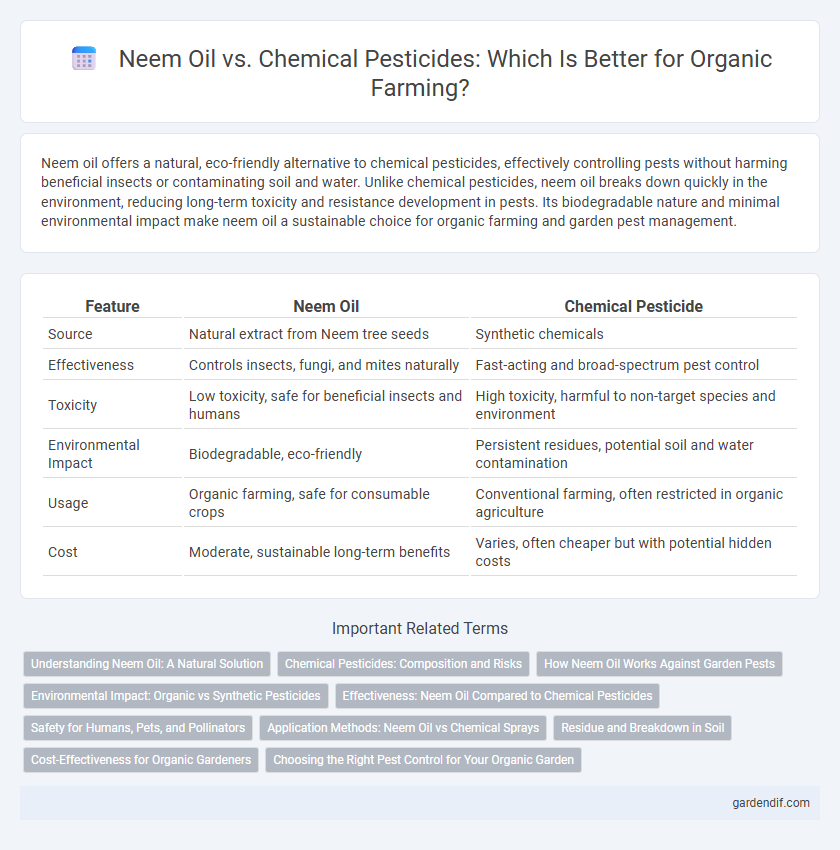
Neem oil vs chemical pesticide Illustration
Neem oil offers a natural, eco-friendly alternative to chemical pesticides, effectively controlling pests without harming beneficial insects or contaminating soil and water. Unlike chemical pesticides, neem oil breaks down quickly in the environment, reducing long-term toxicity and resistance development in pests. Its biodegradable nature and minimal environmental impact make neem oil a sustainable choice for organic farming and garden pest management.
Table of Comparison
| Feature | Neem Oil | Chemical Pesticide |
|---|---|---|
| Source | Natural extract from Neem tree seeds | Synthetic chemicals |
| Effectiveness | Controls insects, fungi, and mites naturally | Fast-acting and broad-spectrum pest control |
| Toxicity | Low toxicity, safe for beneficial insects and humans | High toxicity, harmful to non-target species and environment |
| Environmental Impact | Biodegradable, eco-friendly | Persistent residues, potential soil and water contamination |
| Usage | Organic farming, safe for consumable crops | Conventional farming, often restricted in organic agriculture |
| Cost | Moderate, sustainable long-term benefits | Varies, often cheaper but with potential hidden costs |
Understanding Neem Oil: A Natural Solution
Neem oil, derived from the seeds of the Azadirachta indica tree, serves as a powerful natural pesticide with broad-spectrum insecticidal properties. Its active compound, azadirachtin, disrupts pest growth and reproduction without harming beneficial insects or soil health. Unlike chemical pesticides, neem oil biodegrades quickly and minimizes environmental toxicity, making it a sustainable choice for organic farming.
Chemical Pesticides: Composition and Risks
Chemical pesticides are synthetic compounds composed of various toxic substances such as organophosphates, carbamates, and pyrethroids, designed to eliminate or control pests rapidly. These chemicals pose significant risks to human health, including neurotoxicity, hormonal disruption, and potential carcinogenic effects, while also contaminating soil and water ecosystems. Persistent use leads to pesticide resistance among pests and negatively impacts beneficial insects, biodiversity, and overall environmental sustainability.
How Neem Oil Works Against Garden Pests
Neem oil disrupts the life cycle of garden pests by interfering with their hormonal systems, making it difficult for them to grow, reproduce, and feed. Its active compound, azadirachtin, acts as a natural insect repellent and growth regulator, effectively targeting harmful insects without harming beneficial ones. Unlike chemical pesticides, neem oil provides a safer, eco-friendly solution that decomposes quickly, reducing environmental impact while protecting plants.
Environmental Impact: Organic vs Synthetic Pesticides
Neem oil, derived from the Azadirachta indica tree, offers a biodegradable and non-toxic alternative to synthetic pesticides, significantly reducing soil and water contamination. Chemical pesticides often contain harmful compounds that persist in the environment, disrupting ecosystems and harming beneficial insects such as pollinators and natural predators. Using neem oil promotes sustainable agriculture by minimizing environmental residues and fostering biodiversity, making it a preferred choice for eco-friendly pest management.
Effectiveness: Neem Oil Compared to Chemical Pesticides
Neem oil offers a natural, broad-spectrum pest control solution effective against a wide range of insects including aphids, whiteflies, and spider mites, by disrupting their life cycle and feeding behavior. Chemical pesticides often provide rapid knockdown effects but can lead to pest resistance and environmental toxicity over time. Studies show neem oil maintains pest population control while promoting beneficial insect health and soil microbiome balance, making it a sustainable alternative to synthetic chemicals.
Safety for Humans, Pets, and Pollinators
Neem oil offers a safer alternative to chemical pesticides by being non-toxic to humans, pets, and essential pollinators such as bees and butterflies. Its natural compounds degrade quickly in the environment, reducing harmful residues and minimizing health risks associated with synthetic chemicals. Unlike chemical pesticides that can cause neurological and respiratory issues, neem oil's biodegradability and selective action help preserve ecosystem health while effectively controlling pests.
Application Methods: Neem Oil vs Chemical Sprays
Neem oil is applied as a foliar spray or soil drench, offering targeted pest control with minimal environmental impact and biodegradability. Chemical pesticides are typically sprayed over large areas, often leading to runoff, non-target species harm, and potential soil and water contamination. Precision in neem oil application enhances pest control efficacy while maintaining ecological balance compared to broader chemical spray methods.
Residue and Breakdown in Soil
Neem oil rapidly breaks down in soil due to its natural compounds, leaving minimal residue that reduces environmental impact compared to chemical pesticides. Chemical pesticides often persist in the soil for extended periods, accumulating residues that can harm beneficial microorganisms and lead to soil toxicity. Using neem oil supports healthier soil ecosystems by promoting faster degradation and minimizing long-term contamination.
Cost-Effectiveness for Organic Gardeners
Neem oil offers organic gardeners a cost-effective alternative to chemical pesticides by reducing the need for frequent applications due to its slow-release effect and broad-spectrum pest control. While chemical pesticides may provide quick results, their repeated use leads to higher long-term expenses and potential soil damage, increasing garden maintenance costs. Neem oil's natural pest resistance and soil-friendly properties contribute to sustainable gardening practices, minimizing financial and environmental impact.
Choosing the Right Pest Control for Your Organic Garden
Neem oil offers a natural, biodegradable alternative to chemical pesticides, effectively targeting a wide range of pests without harming beneficial insects or soil health. Its active compounds, like azadirachtin, disrupt pest growth and reproduction while minimizing environmental impact. Choosing neem oil supports sustainable pest management practices essential for maintaining an organic garden's ecological balance.
Neem oil vs chemical pesticide Infographic

 gardendif.com
gardendif.com